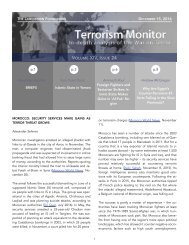SUMMARY
2016_classification_of_programmes_against_violent_islamist_extremism.pdf?utm_content=buffer41973&utm_medium=social&utm_source=twitter
2016_classification_of_programmes_against_violent_islamist_extremism.pdf?utm_content=buffer41973&utm_medium=social&utm_source=twitter
Create successful ePaper yourself
Turn your PDF publications into a flip-book with our unique Google optimized e-Paper software.
FOREWORD BY THE EDITOR<br />
Prevention clearly includes a wide range of social, educational<br />
and therapeutic approaches. Its success often depends on the extent<br />
to which adolescents and young adults are able to participate<br />
within society and that they are shown a direction in life<br />
that is worth pursuing. Development psychology and educational<br />
science show that the path of discovering one’s identity during<br />
youth does not always run smoothly for some young people. Unfortunately,<br />
the “search for meaning” is, on occasions, first answered<br />
by the attention and support provided by extremists, due,<br />
for example, to prolonged personal experiences of exclusion and<br />
rejection. The prevention of radicalisation is the job of those who<br />
have taken on responsibility for young persons, for example, in<br />
schools, in training or education programmes and, of course, not<br />
least of all, in families and their networks. The state is obliged to<br />
offer advice and support, in certain cases, very intensively and for<br />
longer periods.<br />
Germany’s national programmes, “Demokratie leben!”[Living<br />
Democracy] and “Zusammenhalt durch Teilhabe” [Cohesion<br />
through Participation] along with additional state initiatives, provide<br />
the financial support for the local prevention work of authorities,<br />
independent organisations and civil society. Germany’s<br />
federal government alone has provided well over 50 million euros.<br />
This amount is expected to double in the budget for 2017.<br />
It is necessary for the dissemination and quality of the measures<br />
to continue to be evaluated in different ways. The positive effects<br />
are difficult to measure, the evaluation method at times touching<br />
the sensibilities of the actors involved. In some places, there are<br />
not sufficient programmes in place, while in others the quality<br />
may be lacking.<br />
To avoid any misunderstandings: without the numerous initiatives,<br />
projects and programmes being offered by dedicated experts<br />
and professionals, there would be even greater problems.<br />
Thus it is necessary to further qualify the programmes that are in<br />
place, to monitor the effects, to fill any regional gaps and to consolidate<br />
successful approaches that are in place. An agreement








